新课标人教版必修1 Unit 4 Earthquake Reading课件
文档属性
| 名称 | 新课标人教版必修1 Unit 4 Earthquake Reading课件 | 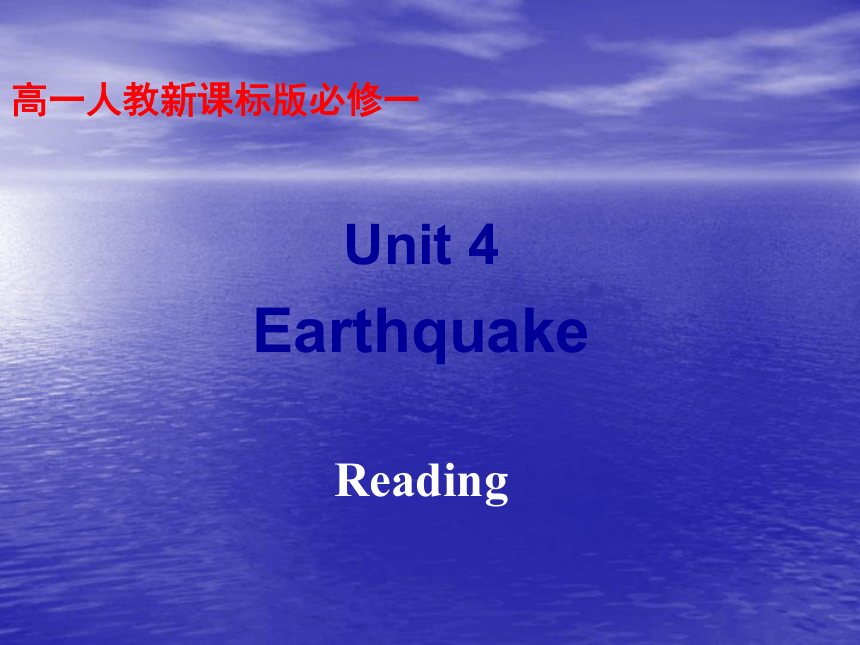 | |
| 格式 | rar | ||
| 文件大小 | 3.4MB | ||
| 资源类型 | 教案 | ||
| 版本资源 | 人教版(新课程标准) | ||
| 科目 | 英语 | ||
| 更新时间 | 2011-08-20 10:08:42 | ||
图片预览

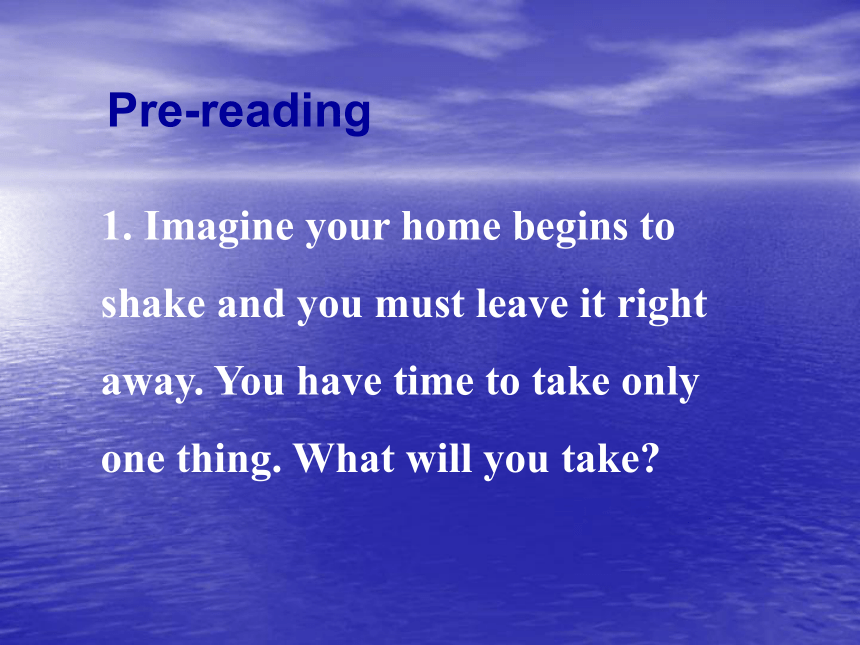
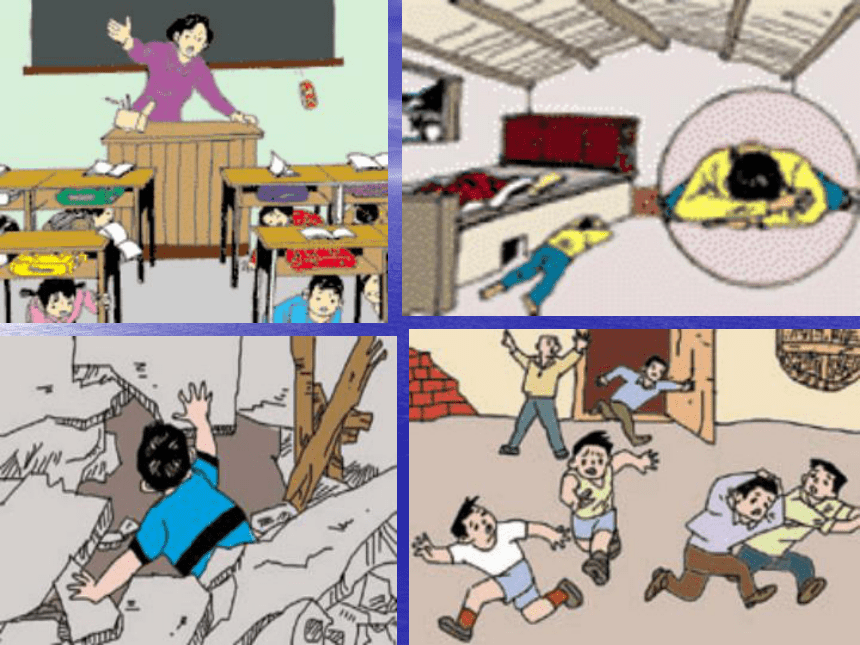
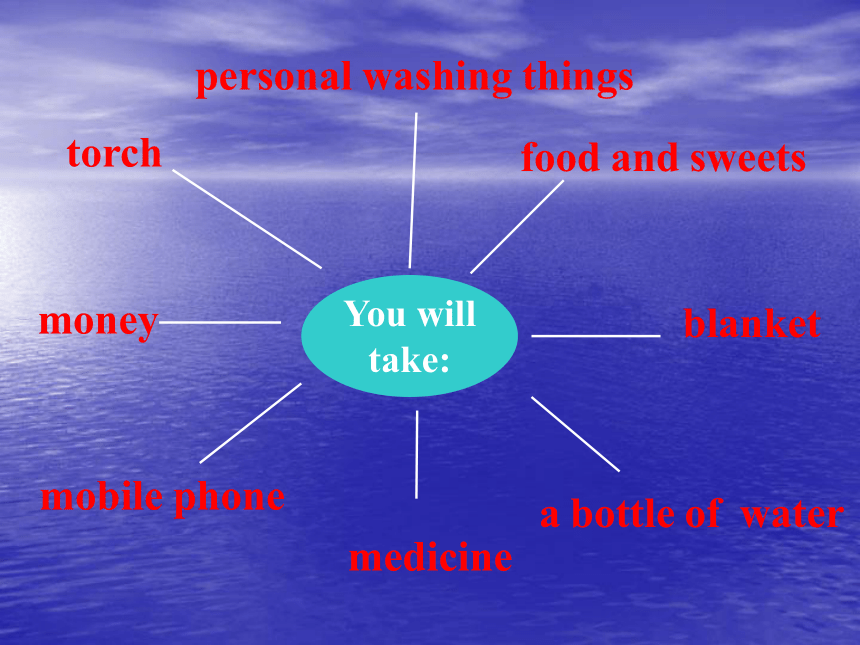
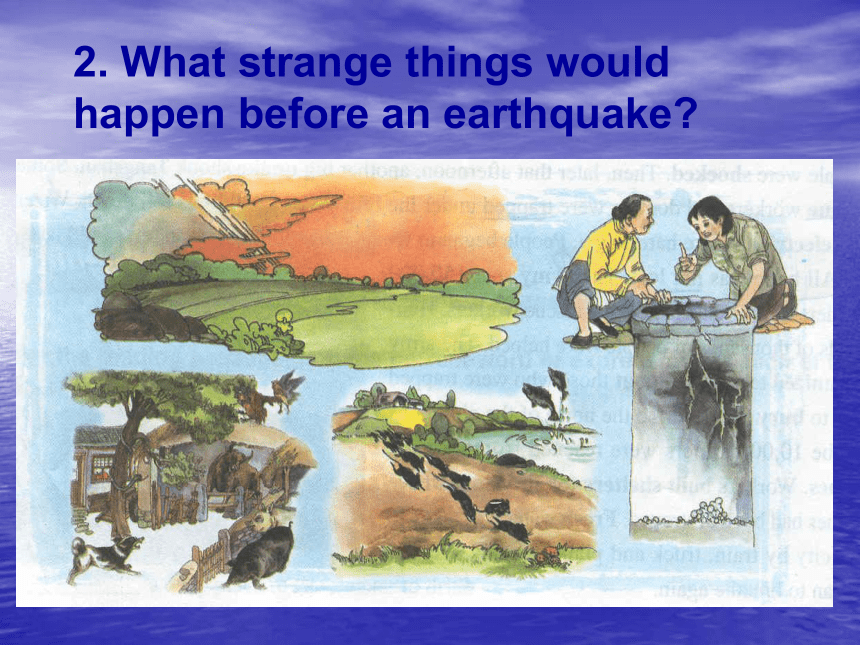
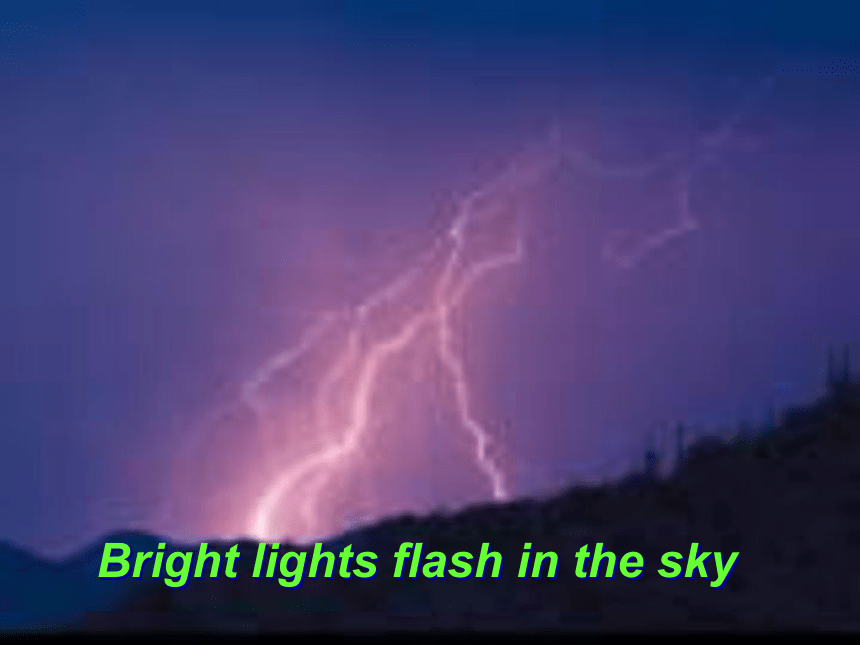
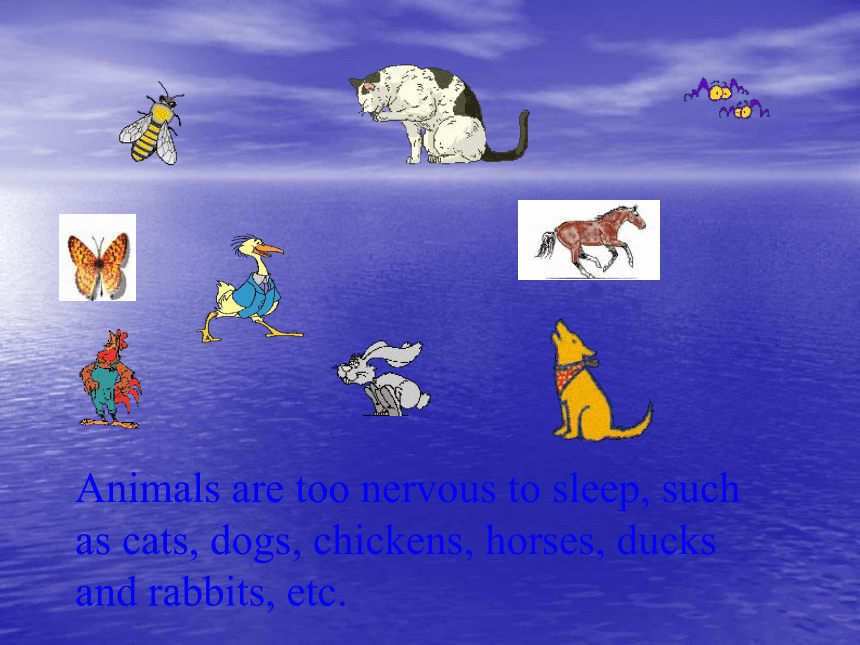
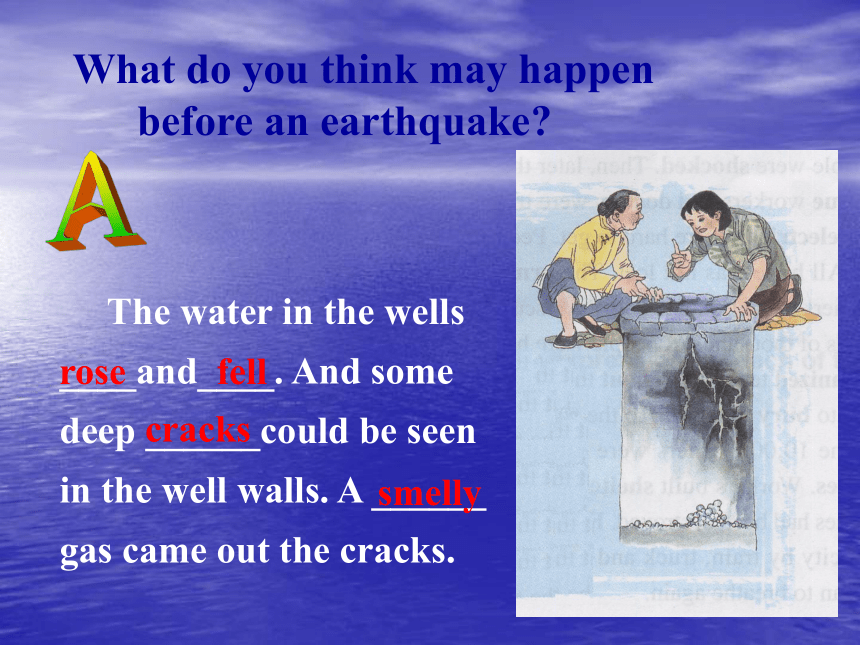
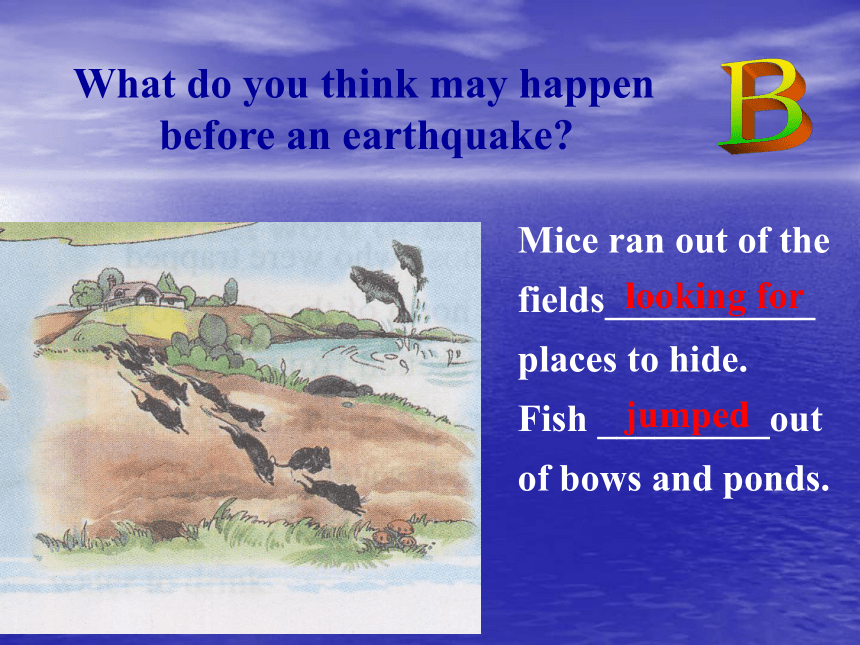
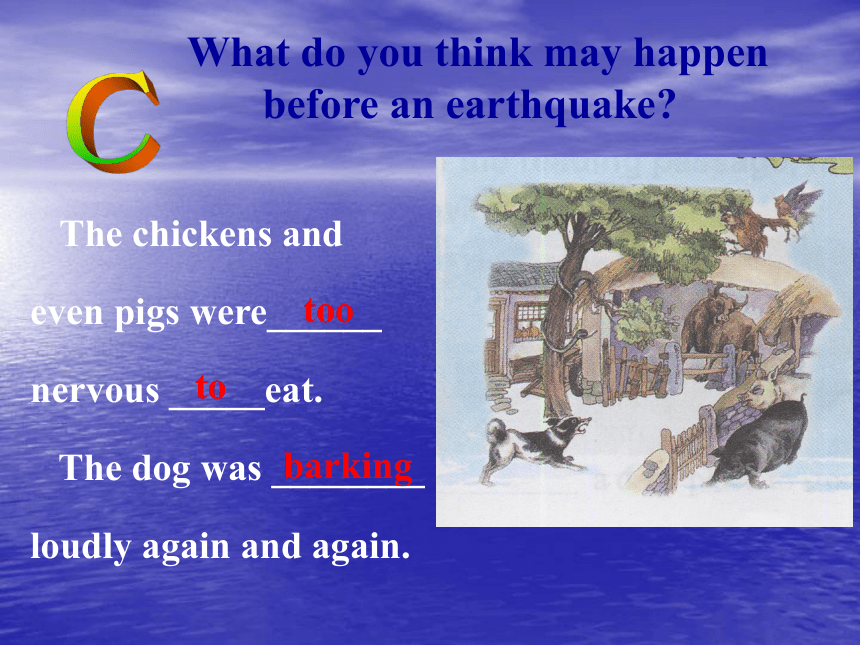
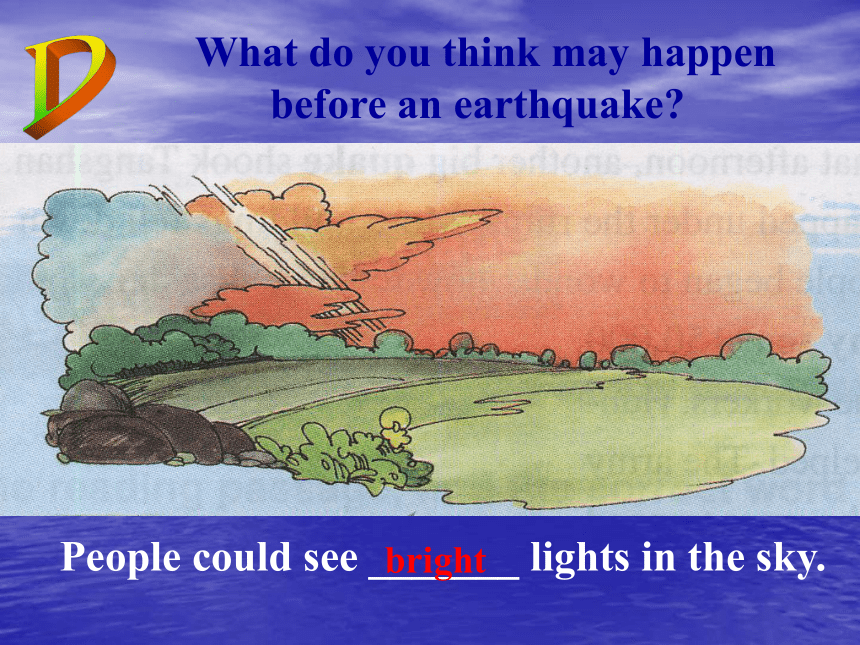
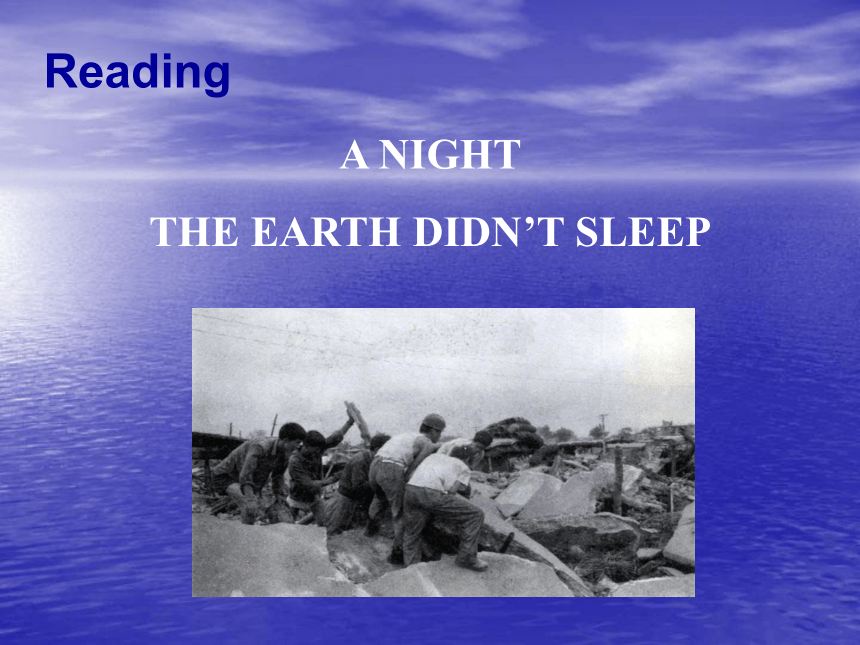
文档简介
(共80张PPT)
Unit 4
Earthquake
Reading
高一人教新课标版必修一
1. Imagine your home begins to shake and you must leave it right away. You have time to take only one thing. What will you take
Pre-reading
personal washing things
a bottle of water
money
torch
mobile phone
food and sweets
blanket
medicine
You will
take:
2. What strange things would
happen before an earthquake
Bright lights flash in the sky
Animals are too nervous to sleep, such as cats, dogs, chickens, horses, ducks and rabbits, etc.
What do you think may happen
before an earthquake
The water in the wells
____and____. And some
deep ______could be seen
in the well walls. A ______
gas came out the cracks.
rose
fell
cracks
smelly
What do you think may happen
before an earthquake
Mice ran out of the
fields___________
places to hide.
Fish _________out
of bows and ponds.
looking for
jumped
What do you think may happen
before an earthquake
The chickens and
even pigs were______
nervous _____eat.
The dog was ________
loudly again and again.
too
to
barking
What do you think may happen
before an earthquake
People could see _______ lights in the sky.
bright
A NIGHT
THE EARTH DIDN’T SLEEP
Reading
Paragraph 1
Paragraph 2
Paragraph 3
Look at the each part and write
down its main idea.
Part 1
Part 2
Before the earthquake strange things began to happen but no one took any notice of them.
The earthquake destroyed the city of Tangshan and shocked the people very much.
Paragraph 4
Part 3
The army came to help the survivors, bringing hope for a new life.
Join the correct parts of the sentences.
2 The people didn’t
worry because
1 The chickens didn’t eat because
C they were
nervous.
E they didn’t
know what the
strange events
meant.
3 Such a great
number of people died because
4 Water was needed
because
5 The people did not lose hope because
D dams and wells
were useless.
B the quake
happened while
they were
sleeping.
A the army
came to help
them.
Make a timeline
Time Event
For three days
At 3:42 am
Later that afternoon
Soon after the quakes
For three days
smelly gas
came out of
fish: jump
well water rose and fall
cracks
chickens, pigs:
too nervous
to eat
mice:
run out
to hide
In the well
In the farmyard
At about 3:00 am on July 28, 1976
the sound of planes could
be heard
water pipes:
cracked and burst
bright light
were in the sky
In the sky
In the city
House, roads
and canals
Steam
Hills of rock
The large city
had a huge crack
burst from hole in the ground.
became rivers of dirt
lay in ruins
At 3:42 am
Later that afternoon
At 3:42 am, everything began to s_____. It
seemed that the world was a__ ___ ____.
O________(1/3) of the nation f____ it. A
h_____ crack cut across the city. The city lay
i__ _____. Two-thirds of the people d____ or
were i_______. Then later that afternoon,
another big quake s______ Tang Shan, which
t_______ many r______workers and doctors.
People began to wonder how long the d______
would l_____.
hake
ne-third
elt
uge
n ruins
ied
njured
hook
rapped
escue
isaster
ast
t an end
Fill in the blanks.
Soon after the quakes
The army:
Workers:
---sent soldiers to Tangshan. organized teams to dig out those who were trapped and to bury the dead.
---built shelters for survivors whose homes had been destroyed.
Result:
The city began to breathe again.
True ( T )or false( F )
Two-thirds of the nation felt the earthquake.
( )
2. All the people in Tangshan were dead or
injured during the earthquake. ( )
3. All of the city’s hospitals, factories, buildings
and homes were damaged in the earthquake.
( )
F
F
F
One-third
Two-thirds
75%
90%
75%
4. Later that afternoon, a terrible
earthquake shook Tangshan again. ( )
5. People slept outdoors after the
earthquake. ( )
T
T
6. Not only the people but also the animals were shocked greatly.
7. Many rescue workers and doctors were trapped under the ruins during the aftershock.
T
T
1. What is the passage mainly about
An earthquake happened in Tangshan in 1976.
Read the text carefully and answer these questions.
3. What did people hear
2. What did people in Tangshan see
in the sky before the earthquake
They saw bright lights in the sky.
They heard the sound of planes outside Tangshan even when no planes were in the sky.
4. What did people notice in the wells
5. Did people pay any attention to
these abnormal phenomena
People noticed the well walls had
deep cracks, and a smelly gas came
out of the cracks.
No. They went to the bed as
usual that night.
6. When did the earthquake begin
7. How many people were killed or
injured in the earthquake
8. Could the injured people go to
hospital
More than 400, 000 people.
At 3:42 in the morning of July 28.
No, they couldn’t because all of
the city’s hospitals were gone in
the quake.
How do you understand the real meaning
of the idiom “It is always calm before a
storm”
A. It is unusually quiet before a thunderstorm
or hurricane hit.
B. One should not trust situations that seem
peaceful since bad things may happen.
C. The weather is fine before a storm comes.
D. You should stay calm before a storm.
Choose the best answer.
A
2. What can be inferred from the passage
If the pigs were too nervous to eat, there
must be an earthquake.
B. If some natural signs had not been ignored,
all the people in Tangshan city might have
had a chance to survive.
C. There wouldn’t have been such a great
quake if people had paid enough attention
to some natural signs.
D. If some natural signs had not been ignored,
people might have had a chance to survive.
D
3. Which of the following is the main reason
for the heavy loss of life in the quake
A. The earthquake happened in the deep night
when people were sleeping deeply.
B. There weren’t enough rescue workers.
C. The building were poorly constructed and
most of them were destroyed in the quake.
D. People were not careful enough to notice
some natural signs before the earthquake.
A
1. ___ of the nation felt the earthquake.
2. A huge crack that was __ kilometres long and ____ metres wide cut across houses.
3. In ____ terrible seconds a large city
lay in ruins.
1/3
8
30
15
Read the text again and fill in the blanks with words or numbers.
4. ____ of the people died or were injured
during the earthquake.
5. The number of people who were killed
or injured reached more than _______.
6. All of the city’s hospitals, _____ of its
factories and buildings and _____ of its
homes were gone.
2/3
400,000
75%
90%
Tang shan’s new look
How can we protect ourselves
(自我保护)in an earthquake
A
Hide under the hard furniture
( 家具 ).
Put out the fire
and turn off the gas.
B
Never try to use the lift.
C
Use something
hard (硬的) to protect your head.
D
Life is so beautiful.
We must love our lives.
In an earthquake
SPEED IS LIFE.
1. Imagine your home begins to shake
and you must leave it right away.
1) shake : vi /vt (shook, shaken)
cause to move to and fro
shake hands with sb
shake one’s head over /at sth
e.g. The whole house shook during
the explosion.
The explosion shook the house.
Language Points
2) right away : at once ; in no time ;
immediately
e.g. He is ill; you should send him to
the doctor right away.
right now : at this very moment
Make up your mind ___________.
I’ll return the book ___________.
right now
right away
2. For three days the water in the village
wells rose and fell, rose and fell.
rise (rose, risen) vi
go up; get higher; (of the sun, moon,
stars,etc.) come above the horizon;
stand up , get out of bed
The flood has risen two feet.
She usually rises early in the morning.
rise: 升起; 上升; 上涨
(不能用于被动语态)
raise: 举起; 使升起; 提高
(可用于被动语态)
He _____from his chair when the door
bell rang.
Her job is _______ chickens.
Her temperature is still ______.
He ________ in rank recently.
rose
raising
rising
has risen
3. A smelly gas came out of the cracks.
smelly adj. 发臭的 smell + y = adj.
wind----windy dream----dreamy
ice----icy health ---- healthy
wealth ---- wealthy wind ---- windy
smell n./v (smelt/ smelled)
They were all hungry and the food
______ good.
I can ______something burning in the
kitchen.
Please throw the _______ fish away.
smelt
smell
smelly
4. … the water pipes in some buildings
cracked and _____.
burst
burst : to come open or fly apart suddenly
The balloon suddenly burst.
burst into + n.
Some robbers burst into that house.
burst out
burst out + doing
They burst out laughing.
He burst into laughter.
= He burst out laughing.
He burst into tears.
= He burst out crying.
burst into+ n.
burst out + doing……
5. event 名词, 意为“(重要的、不同寻常
的)事件”。如:
Leaving home was a major event in his life.
This is one of the most important events
in the history of mankind.
event 意思还有“(事先安排好的)演出, 赛事,
聚会”, “(体育比赛的)运动项目”等。如:
The meeting was an important social event.
The 800 metres is not his best event.
event构成的常用短语有:
in any/either event = at all events
不管怎样, 无论如何;
in the event 结果, 到头来;
in the event of sth/in the event that …
万一, 假如发生……的情况;
field event 田赛项目
track event 径赛项目
three-day event 三日马术赛。如:
In any event, the worst that she can
do is say “NO”.
In the event of rain, the party will
be held indoors.
Lily didn’t like Tom, but in the
event she married him.
He leaves a letter for me to read in
the event that he will die.
6. It seemed as if the world was at an end.
1) as if
as if 在表语从句中相当于that:
It seemed as if the meeting would
never end. 看起来会议没完没了。
It seemed as if the world was at an end!= It seemed that the world was
at an end!
as if 似乎, 好像 = as though
She spoke to me as if she knew me.
她和我说话的神情, 好像她早就
认识我似的。
as if后还可跟名词、形容词、不定式
等。如:
He acts as if (he was) a fool.
She left the room hurriedly as if
(she was) angry.
Tom raised his hands as if (he was
going) to say something.
用动词的适当形式填空。
It looks as if it ______ (be) going to rain.
He talks as if he _____ (know) where she is.
The girl listened as if she
_______________ (turn) to stone.
is/were
knows
had been turned
2) at an end 意为“结束”。如:
The war was at an end.
I must warn you that my patience
is almost at an end.
end用作名词构成的短语:
at the end (of) 在……末尾
by the end of 到……为止
in the end 最后, 终于
come to an end 完结
at the end of 用于表示具体事物或场所
的场合, 它也可以用来表示比喻意;
by the end of 用于表示时间的场合到
……结束的时候, 用语过去完成时态;
in the end 意思“最后、终于”。
用end构成的短语填空。
The cold weather at last stopped
____________ March.
Our hunt for a cheaper but larger
house is at last ________.
If you go on with work, you’ll succeed
_________.
How many English words had you
learned ____________ last term
at the end of
at an end
in the end
by the end of
7. In fifteen terrible seconds a large
city lay in ruins.
ruin 在此为名词, 意为“废墟”,
常和介词in搭配, in ruins意为“成废
墟, 垮掉, 毁灭”。如:
This earthquake left the whole
town in ruins.
His future is/lies in ruins.
ruin用作名词, 构成的常见短语有:
be on the road to ruin 正在走向毁灭、
be the ruin of 使……破产、身体垮掉、
名誉扫地
be/lie in ruins 变成废墟
go to ruin = fall into ruin 衰落, 败落 如:
The company cannot pay its bills and is
on the road to ruin.
Drinking was the ruin of him.
He had let the farm go to ruin.
ruin还可作动词, 意为“毁坏, 毁掉”,
ruined作形容词时, 只用在名词前,
意为“毁坏的, 破败不堪的”。如:
This illness has ruined his life.
The rain ruined my painting.
When we got there, we saw a ruined
castle.
①damage指部分“损坏”、“损害”、“破坏”
或指使用价值有所降低。它可以用作动词,
也可以用作名词, 用作名词时常与to
something 连用。如:
The accident did a lot of damage to his car.
②destroy 只能用作动词,指彻底破坏, 以致
不可能修复,常作“破坏”、“毁灭”解,也可以
指希望、计划等打破。
The earthquake destroyed almost the
whole town.
辨析: damage, ruin, destroy
③ruin则表示破坏严重,以致不能修复,但这种
破坏不像destroy那样毁灭某物,而是强调致
使该物的使用价值发生了问题。用作动词时,
它作 “使毁灭”、 “使崩溃”、 “弄糟”解;用作
名词时,它表示 “毁灭”、 “瓦解”、 “废墟”等
抽象概念。ruin也有借喻的用法。
The fire ruined the castle.
The house has fallen into ruin.
The company is facing ruin.
The village ___ in ruins after the war.
These machines have ____ idle since the
factory closed.
An earthquake left the whole town_______.
His career is ________.
Everywhere they looked nearly everything
was _________.
He ______ his girl friend’s prospects
Soft wood ________ easily.
lay
lain
in ruins
in ruins
destroyed
ruined
damages
8. Two-thirds of the people died or were
_______ during the earthquake.
injured
More than 61% of the surface of the
earth ____covered by water.
Seventy percent of the workers in this factory ____ young.
is
are
injure: to hurt oneself/ sb. / sth. physically
n. injury adj. injured
the injured 伤者, 伤员
an injured look/expression 委屈的样子/表情
injured pride/feelings 受到伤害的自尊、
情感 如:
He suffered serious injuries to the arms
and legs.
Many of the injured are still in a serious
condition.
Their criticisms _________ him deeply.
Smoking will ________ his health.
He was slightly ________ in the car accident.
He got _________ in the fighting.
What you said _____ my feeling.
have hurt
injured
injured
wounded
hurt
Compare: injure;
hurt;
wound
9. People were shocked.
shock: n. 打击; 震惊, 震动
vt. 使震惊, 使惊愕
shocking: adj. 使人震惊的
The news of his wife’s death was a
terrible shock to him.
You will get a shock if you touch
the live wire.
I was shocked by his rudeness.
His failure in the exam was shocking
to his parents.
10. Such a great number of people died
because the quake happened while they
were sleeping.
a number of 几个, 若干
a great/good number of 许多, 大量 如:
A number of students are planting trees
on the hill.
A great number of volunteers are helping
those people living in the earthquake-hit
area.
a number of修饰可数名词的复数,
number 前可用large, small, good,
certain, great等修饰词。当它修饰
主语时, 谓语动词用复数。注意:
the number of 意为“……的数量, 数目”,
当它与后面的名词连用时, 中心词是
the number, 做主语时谓语用单数。
用a number of和the number of填空。
____________ students are watching
the games on the playground.
______________ trees planted in our
village is never under 200 every year.
The number of
A number of
辨析: a (great) number of; a great deal
of; a lot of; plenty of
a (great) number of 修饰可数名词,
跟复数形式;
a great deal of 修饰不可数名词;
a lot of 后面既可以加可数名词,
也可以加不可数名词;
plenty of 后面既可以加可数名词,
也可以加不可数名词。
11. Some of the rescue workers and
doctors were trapped under the ruins.
trap 1) 做动词
困住, 使陷于困境 如:
Dozens of people were trapped in
the building when the fire took place.
There’s no way out! We’re trapped!
Julia felt trapped in her role of wife
and mother.
诱骗, 诱使(trap sb into doing sth)”;
夹住, 压扁; 把……储存 如:
I was trapped into telling a lie.
Take care not to trap your fingers
in the door.
How can you trap the sun’s heat
2) trap还可作名词, 意为“圈套; 陷阱;
计谋”, 构成的常见短语有:
set a trap 设置陷阱
fall/walk into a trap 落入圈套
lay a trap for 为……设下圈套
fall into the trap of doing sth
做某事不明智
keep your trap shut
不把……说出去, 不泄密 如:
She felt that marriage was a trap.
The police set a trap to catch the thief.
Don’t fall into the trap of investing
all your money in one place.
Just keep your trap shut, and we
won’t get into trouble.
12. People began to ________ how long the
disaster would last.
wonder : v.
1) to have a feeling of surprise.
2) to be filled with curiosity or doubt.
n. one that arouses astonishment,
surprise ; admiration
It is no wonder (that)= No wonder (that)
wonder
---Tom often works deep into the night
every day.
---No wonder he always gets first in the
examinations.
13. All hope was not lost.
all…not … = not all…; some… but not all
Not all the children are left.
(= Only some of them left early.)
Not all the children are noisy.
(= Some of the children are not noisy.)
none of …..
None of us were allowed to go there.
None of these reports is very helpful.
14. The army organized teams to dig out
those who were trapped and to bury the
dead.
dig out 挖掘; 发现
bury : A. to place in the ground
B. to occupy (oneself) with deep
concentration; absorb
The dog buried the bone in the ground.
I buried myself in my studies.
bury oneself in= be buried in
devote oneself to= be devoted to
1. Finish Exercise 1-4 on page 28.
2. Underline the important phrases
and sentences in the text.
Homework
Unit 4
Earthquake
Reading
高一人教新课标版必修一
1. Imagine your home begins to shake and you must leave it right away. You have time to take only one thing. What will you take
Pre-reading
personal washing things
a bottle of water
money
torch
mobile phone
food and sweets
blanket
medicine
You will
take:
2. What strange things would
happen before an earthquake
Bright lights flash in the sky
Animals are too nervous to sleep, such as cats, dogs, chickens, horses, ducks and rabbits, etc.
What do you think may happen
before an earthquake
The water in the wells
____and____. And some
deep ______could be seen
in the well walls. A ______
gas came out the cracks.
rose
fell
cracks
smelly
What do you think may happen
before an earthquake
Mice ran out of the
fields___________
places to hide.
Fish _________out
of bows and ponds.
looking for
jumped
What do you think may happen
before an earthquake
The chickens and
even pigs were______
nervous _____eat.
The dog was ________
loudly again and again.
too
to
barking
What do you think may happen
before an earthquake
People could see _______ lights in the sky.
bright
A NIGHT
THE EARTH DIDN’T SLEEP
Reading
Paragraph 1
Paragraph 2
Paragraph 3
Look at the each part and write
down its main idea.
Part 1
Part 2
Before the earthquake strange things began to happen but no one took any notice of them.
The earthquake destroyed the city of Tangshan and shocked the people very much.
Paragraph 4
Part 3
The army came to help the survivors, bringing hope for a new life.
Join the correct parts of the sentences.
2 The people didn’t
worry because
1 The chickens didn’t eat because
C they were
nervous.
E they didn’t
know what the
strange events
meant.
3 Such a great
number of people died because
4 Water was needed
because
5 The people did not lose hope because
D dams and wells
were useless.
B the quake
happened while
they were
sleeping.
A the army
came to help
them.
Make a timeline
Time Event
For three days
At 3:42 am
Later that afternoon
Soon after the quakes
For three days
smelly gas
came out of
fish: jump
well water rose and fall
cracks
chickens, pigs:
too nervous
to eat
mice:
run out
to hide
In the well
In the farmyard
At about 3:00 am on July 28, 1976
the sound of planes could
be heard
water pipes:
cracked and burst
bright light
were in the sky
In the sky
In the city
House, roads
and canals
Steam
Hills of rock
The large city
had a huge crack
burst from hole in the ground.
became rivers of dirt
lay in ruins
At 3:42 am
Later that afternoon
At 3:42 am, everything began to s_____. It
seemed that the world was a__ ___ ____.
O________(1/3) of the nation f____ it. A
h_____ crack cut across the city. The city lay
i__ _____. Two-thirds of the people d____ or
were i_______. Then later that afternoon,
another big quake s______ Tang Shan, which
t_______ many r______workers and doctors.
People began to wonder how long the d______
would l_____.
hake
ne-third
elt
uge
n ruins
ied
njured
hook
rapped
escue
isaster
ast
t an end
Fill in the blanks.
Soon after the quakes
The army:
Workers:
---sent soldiers to Tangshan. organized teams to dig out those who were trapped and to bury the dead.
---built shelters for survivors whose homes had been destroyed.
Result:
The city began to breathe again.
True ( T )or false( F )
Two-thirds of the nation felt the earthquake.
( )
2. All the people in Tangshan were dead or
injured during the earthquake. ( )
3. All of the city’s hospitals, factories, buildings
and homes were damaged in the earthquake.
( )
F
F
F
One-third
Two-thirds
75%
90%
75%
4. Later that afternoon, a terrible
earthquake shook Tangshan again. ( )
5. People slept outdoors after the
earthquake. ( )
T
T
6. Not only the people but also the animals were shocked greatly.
7. Many rescue workers and doctors were trapped under the ruins during the aftershock.
T
T
1. What is the passage mainly about
An earthquake happened in Tangshan in 1976.
Read the text carefully and answer these questions.
3. What did people hear
2. What did people in Tangshan see
in the sky before the earthquake
They saw bright lights in the sky.
They heard the sound of planes outside Tangshan even when no planes were in the sky.
4. What did people notice in the wells
5. Did people pay any attention to
these abnormal phenomena
People noticed the well walls had
deep cracks, and a smelly gas came
out of the cracks.
No. They went to the bed as
usual that night.
6. When did the earthquake begin
7. How many people were killed or
injured in the earthquake
8. Could the injured people go to
hospital
More than 400, 000 people.
At 3:42 in the morning of July 28.
No, they couldn’t because all of
the city’s hospitals were gone in
the quake.
How do you understand the real meaning
of the idiom “It is always calm before a
storm”
A. It is unusually quiet before a thunderstorm
or hurricane hit.
B. One should not trust situations that seem
peaceful since bad things may happen.
C. The weather is fine before a storm comes.
D. You should stay calm before a storm.
Choose the best answer.
A
2. What can be inferred from the passage
If the pigs were too nervous to eat, there
must be an earthquake.
B. If some natural signs had not been ignored,
all the people in Tangshan city might have
had a chance to survive.
C. There wouldn’t have been such a great
quake if people had paid enough attention
to some natural signs.
D. If some natural signs had not been ignored,
people might have had a chance to survive.
D
3. Which of the following is the main reason
for the heavy loss of life in the quake
A. The earthquake happened in the deep night
when people were sleeping deeply.
B. There weren’t enough rescue workers.
C. The building were poorly constructed and
most of them were destroyed in the quake.
D. People were not careful enough to notice
some natural signs before the earthquake.
A
1. ___ of the nation felt the earthquake.
2. A huge crack that was __ kilometres long and ____ metres wide cut across houses.
3. In ____ terrible seconds a large city
lay in ruins.
1/3
8
30
15
Read the text again and fill in the blanks with words or numbers.
4. ____ of the people died or were injured
during the earthquake.
5. The number of people who were killed
or injured reached more than _______.
6. All of the city’s hospitals, _____ of its
factories and buildings and _____ of its
homes were gone.
2/3
400,000
75%
90%
Tang shan’s new look
How can we protect ourselves
(自我保护)in an earthquake
A
Hide under the hard furniture
( 家具 ).
Put out the fire
and turn off the gas.
B
Never try to use the lift.
C
Use something
hard (硬的) to protect your head.
D
Life is so beautiful.
We must love our lives.
In an earthquake
SPEED IS LIFE.
1. Imagine your home begins to shake
and you must leave it right away.
1) shake : vi /vt (shook, shaken)
cause to move to and fro
shake hands with sb
shake one’s head over /at sth
e.g. The whole house shook during
the explosion.
The explosion shook the house.
Language Points
2) right away : at once ; in no time ;
immediately
e.g. He is ill; you should send him to
the doctor right away.
right now : at this very moment
Make up your mind ___________.
I’ll return the book ___________.
right now
right away
2. For three days the water in the village
wells rose and fell, rose and fell.
rise (rose, risen) vi
go up; get higher; (of the sun, moon,
stars,etc.) come above the horizon;
stand up , get out of bed
The flood has risen two feet.
She usually rises early in the morning.
rise: 升起; 上升; 上涨
(不能用于被动语态)
raise: 举起; 使升起; 提高
(可用于被动语态)
He _____from his chair when the door
bell rang.
Her job is _______ chickens.
Her temperature is still ______.
He ________ in rank recently.
rose
raising
rising
has risen
3. A smelly gas came out of the cracks.
smelly adj. 发臭的 smell + y = adj.
wind----windy dream----dreamy
ice----icy health ---- healthy
wealth ---- wealthy wind ---- windy
smell n./v (smelt/ smelled)
They were all hungry and the food
______ good.
I can ______something burning in the
kitchen.
Please throw the _______ fish away.
smelt
smell
smelly
4. … the water pipes in some buildings
cracked and _____.
burst
burst : to come open or fly apart suddenly
The balloon suddenly burst.
burst into + n.
Some robbers burst into that house.
burst out
burst out + doing
They burst out laughing.
He burst into laughter.
= He burst out laughing.
He burst into tears.
= He burst out crying.
burst into+ n.
burst out + doing……
5. event 名词, 意为“(重要的、不同寻常
的)事件”。如:
Leaving home was a major event in his life.
This is one of the most important events
in the history of mankind.
event 意思还有“(事先安排好的)演出, 赛事,
聚会”, “(体育比赛的)运动项目”等。如:
The meeting was an important social event.
The 800 metres is not his best event.
event构成的常用短语有:
in any/either event = at all events
不管怎样, 无论如何;
in the event 结果, 到头来;
in the event of sth/in the event that …
万一, 假如发生……的情况;
field event 田赛项目
track event 径赛项目
three-day event 三日马术赛。如:
In any event, the worst that she can
do is say “NO”.
In the event of rain, the party will
be held indoors.
Lily didn’t like Tom, but in the
event she married him.
He leaves a letter for me to read in
the event that he will die.
6. It seemed as if the world was at an end.
1) as if
as if 在表语从句中相当于that:
It seemed as if the meeting would
never end. 看起来会议没完没了。
It seemed as if the world was at an end!= It seemed that the world was
at an end!
as if 似乎, 好像 = as though
She spoke to me as if she knew me.
她和我说话的神情, 好像她早就
认识我似的。
as if后还可跟名词、形容词、不定式
等。如:
He acts as if (he was) a fool.
She left the room hurriedly as if
(she was) angry.
Tom raised his hands as if (he was
going) to say something.
用动词的适当形式填空。
It looks as if it ______ (be) going to rain.
He talks as if he _____ (know) where she is.
The girl listened as if she
_______________ (turn) to stone.
is/were
knows
had been turned
2) at an end 意为“结束”。如:
The war was at an end.
I must warn you that my patience
is almost at an end.
end用作名词构成的短语:
at the end (of) 在……末尾
by the end of 到……为止
in the end 最后, 终于
come to an end 完结
at the end of 用于表示具体事物或场所
的场合, 它也可以用来表示比喻意;
by the end of 用于表示时间的场合到
……结束的时候, 用语过去完成时态;
in the end 意思“最后、终于”。
用end构成的短语填空。
The cold weather at last stopped
____________ March.
Our hunt for a cheaper but larger
house is at last ________.
If you go on with work, you’ll succeed
_________.
How many English words had you
learned ____________ last term
at the end of
at an end
in the end
by the end of
7. In fifteen terrible seconds a large
city lay in ruins.
ruin 在此为名词, 意为“废墟”,
常和介词in搭配, in ruins意为“成废
墟, 垮掉, 毁灭”。如:
This earthquake left the whole
town in ruins.
His future is/lies in ruins.
ruin用作名词, 构成的常见短语有:
be on the road to ruin 正在走向毁灭、
be the ruin of 使……破产、身体垮掉、
名誉扫地
be/lie in ruins 变成废墟
go to ruin = fall into ruin 衰落, 败落 如:
The company cannot pay its bills and is
on the road to ruin.
Drinking was the ruin of him.
He had let the farm go to ruin.
ruin还可作动词, 意为“毁坏, 毁掉”,
ruined作形容词时, 只用在名词前,
意为“毁坏的, 破败不堪的”。如:
This illness has ruined his life.
The rain ruined my painting.
When we got there, we saw a ruined
castle.
①damage指部分“损坏”、“损害”、“破坏”
或指使用价值有所降低。它可以用作动词,
也可以用作名词, 用作名词时常与to
something 连用。如:
The accident did a lot of damage to his car.
②destroy 只能用作动词,指彻底破坏, 以致
不可能修复,常作“破坏”、“毁灭”解,也可以
指希望、计划等打破。
The earthquake destroyed almost the
whole town.
辨析: damage, ruin, destroy
③ruin则表示破坏严重,以致不能修复,但这种
破坏不像destroy那样毁灭某物,而是强调致
使该物的使用价值发生了问题。用作动词时,
它作 “使毁灭”、 “使崩溃”、 “弄糟”解;用作
名词时,它表示 “毁灭”、 “瓦解”、 “废墟”等
抽象概念。ruin也有借喻的用法。
The fire ruined the castle.
The house has fallen into ruin.
The company is facing ruin.
The village ___ in ruins after the war.
These machines have ____ idle since the
factory closed.
An earthquake left the whole town_______.
His career is ________.
Everywhere they looked nearly everything
was _________.
He ______ his girl friend’s prospects
Soft wood ________ easily.
lay
lain
in ruins
in ruins
destroyed
ruined
damages
8. Two-thirds of the people died or were
_______ during the earthquake.
injured
More than 61% of the surface of the
earth ____covered by water.
Seventy percent of the workers in this factory ____ young.
is
are
injure: to hurt oneself/ sb. / sth. physically
n. injury adj. injured
the injured 伤者, 伤员
an injured look/expression 委屈的样子/表情
injured pride/feelings 受到伤害的自尊、
情感 如:
He suffered serious injuries to the arms
and legs.
Many of the injured are still in a serious
condition.
Their criticisms _________ him deeply.
Smoking will ________ his health.
He was slightly ________ in the car accident.
He got _________ in the fighting.
What you said _____ my feeling.
have hurt
injured
injured
wounded
hurt
Compare: injure;
hurt;
wound
9. People were shocked.
shock: n. 打击; 震惊, 震动
vt. 使震惊, 使惊愕
shocking: adj. 使人震惊的
The news of his wife’s death was a
terrible shock to him.
You will get a shock if you touch
the live wire.
I was shocked by his rudeness.
His failure in the exam was shocking
to his parents.
10. Such a great number of people died
because the quake happened while they
were sleeping.
a number of 几个, 若干
a great/good number of 许多, 大量 如:
A number of students are planting trees
on the hill.
A great number of volunteers are helping
those people living in the earthquake-hit
area.
a number of修饰可数名词的复数,
number 前可用large, small, good,
certain, great等修饰词。当它修饰
主语时, 谓语动词用复数。注意:
the number of 意为“……的数量, 数目”,
当它与后面的名词连用时, 中心词是
the number, 做主语时谓语用单数。
用a number of和the number of填空。
____________ students are watching
the games on the playground.
______________ trees planted in our
village is never under 200 every year.
The number of
A number of
辨析: a (great) number of; a great deal
of; a lot of; plenty of
a (great) number of 修饰可数名词,
跟复数形式;
a great deal of 修饰不可数名词;
a lot of 后面既可以加可数名词,
也可以加不可数名词;
plenty of 后面既可以加可数名词,
也可以加不可数名词。
11. Some of the rescue workers and
doctors were trapped under the ruins.
trap 1) 做动词
困住, 使陷于困境 如:
Dozens of people were trapped in
the building when the fire took place.
There’s no way out! We’re trapped!
Julia felt trapped in her role of wife
and mother.
诱骗, 诱使(trap sb into doing sth)”;
夹住, 压扁; 把……储存 如:
I was trapped into telling a lie.
Take care not to trap your fingers
in the door.
How can you trap the sun’s heat
2) trap还可作名词, 意为“圈套; 陷阱;
计谋”, 构成的常见短语有:
set a trap 设置陷阱
fall/walk into a trap 落入圈套
lay a trap for 为……设下圈套
fall into the trap of doing sth
做某事不明智
keep your trap shut
不把……说出去, 不泄密 如:
She felt that marriage was a trap.
The police set a trap to catch the thief.
Don’t fall into the trap of investing
all your money in one place.
Just keep your trap shut, and we
won’t get into trouble.
12. People began to ________ how long the
disaster would last.
wonder : v.
1) to have a feeling of surprise.
2) to be filled with curiosity or doubt.
n. one that arouses astonishment,
surprise ; admiration
It is no wonder (that)= No wonder (that)
wonder
---Tom often works deep into the night
every day.
---No wonder he always gets first in the
examinations.
13. All hope was not lost.
all…not … = not all…; some… but not all
Not all the children are left.
(= Only some of them left early.)
Not all the children are noisy.
(= Some of the children are not noisy.)
none of …..
None of us were allowed to go there.
None of these reports is very helpful.
14. The army organized teams to dig out
those who were trapped and to bury the
dead.
dig out 挖掘; 发现
bury : A. to place in the ground
B. to occupy (oneself) with deep
concentration; absorb
The dog buried the bone in the ground.
I buried myself in my studies.
bury oneself in= be buried in
devote oneself to= be devoted to
1. Finish Exercise 1-4 on page 28.
2. Underline the important phrases
and sentences in the text.
Homework
